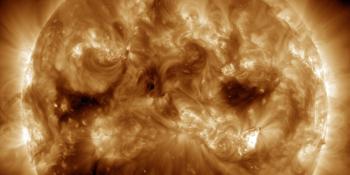Viewing archive of Saturday, 20 September 2003
Solar activity report
Any mentioned solar flare in this report has a scaling factor applied by the Space Weather Prediction Center (SWPC). Because of the SWPC scaling factor, solar flares are reported as 42% smaller than for the science quality data. The scaling factor has been removed from our archived solar flare data to reflect the true physical units.
Report of Solar-Geophysical Activity 2003 Sep 20 2200 UTCPrepared by the NOAA © SWPC and processed by SpaceWeatherLive.com
Joint USAF/NOAA Report of Solar and Geophysical Activity
SDF Number 263 Issued at 2200Z on 20 Sep 2003IA. Analysis of Solar Active Regions and Activity from 19-2100Z to 20-2100Z Solar activity was low during the past 24 hours.
Today's largest event was a C3.6 at 1536 UTC. There was only limited
image data for this event, but it appears to have originated from
newly assigned Region 464 (N05E77) which rotated into view today.
Region 464 is a relatively large (360 millionths) E-type sunspot
group and displayed frequent surge activity during the past 24
hours. Region 461 (N13W89), now crossing the west limb, produced the
second largest event of the day, a C3 at 0512 UTC. Region 459
(S11W40) showed slow growth and occasional brightenings but was
otherwise stable. LASCO images show a coronal mass ejection (CME)
off the west limb, beginning at 0430 UTC. The CME does not appear to
have any earthward component.
IB. Solar Activity Forecast
Solar activity is expected to be low
for the next three days. Regions 464 and 459 are the most likely
sources for activity. There is a slight chance for an isolated
M-class flare.
IIA. Geophysical Activity Summary 19-2100Z to 20-2100Z
The geomagnetic field was at unsettled to minor storm levels with an
isolated major storm period at some locations between 0300-0600 UTC.
Geomagnetic conditions were initially unsettled from 20/2100-21/0000
UTC, but became more disturbed after 0000 UTC and remained so for
the remainder of the day, with active conditions predominating. The
solar wind signatures show the continued presence of a high speed
coronal hole stream. In particular, the solar wind speed showed an
increase around 0000 UTC up to about 700 km/s. The signature is
consistent with the transition of the solar wind source from an
isolated coronal hole in the western hemisphere to a southern polar
extension coronal hole that crossed central meridian on 18
September. The greater than 2 MeV electron fluxes reached high
levels during the past 24 hours.
IIB. Geophysical Activity Forecast
The geomagnetic field is
expected to be mostly active for the next 24 hours as the current
coronal-hole driven disturbance continues. A slight decline to
predominantly unsettled to active is expected for the second and
third days. There is a fair chance for some isolated storm periods
over the next three days.
III. Event Probabilities 21 Sep to 23 Sep
| Class M | 20% | 20% | 20% |
| Class X | 01% | 01% | 01% |
| Proton | 01% | 01% | 01% |
| PCAF | green | ||
IV. Penticton 10.7 cm Flux
Observed 20 Sep 112 Predicted 21 Sep-23 Sep 112/115/115 90 Day Mean 20 Sep 120
V. Geomagnetic A Indices
Observed Afr/Ap 19 Sep 026/032 Estimated Afr/Ap 20 Sep 025/025 Predicted Afr/Ap 21 Sep-23 Sep 020/025-015/020-015/020
VI. Geomagnetic Activity Probabilities 21 Sep to 23 Sep
| A. Middle Latitudes | |||
|---|---|---|---|
| Active | 40% | 45% | 45% |
| Minor storm | 25% | 20% | 20% |
| Major-severe storm | 10% | 05% | 05% |
| B. High Latitudes | |||
|---|---|---|---|
| Active | 25% | 30% | 30% |
| Minor storm | 35% | 25% | 25% |
| Major-severe storm | 20% | 15% | 10% |
All times in UTC
Latest news
Latest forum messages
jsoc 108Unexplained proton activity 52AR4048 97Temporary Topic - Ongoing Solar Proton Events 14Unspecified geomagnetic activity 2188
More topicsSupport SpaceWeatherLive.com!
A lot of people come to SpaceWeatherLive to follow the Sun's activity or if there is aurora to be seen, but with more traffic comes higher server costs. Consider a donation if you enjoy SpaceWeatherLive so we can keep the website online!

Space weather facts
| Last X-flare | 2025/03/28 | X1.1 |
| Last M-flare | 2025/04/01 | M2.5 |
| Last geomagnetic storm | 2025/03/27 | Kp5 (G1) |
| Spotless days | |
|---|---|
| Last spotless day | 2022/06/08 |
| Monthly mean Sunspot Number | |
|---|---|
| February 2025 | 154.6 +17.6 |
| April 2025 | 152.5 -2.1 |
| Last 30 days | 130.7 -17.9 |


